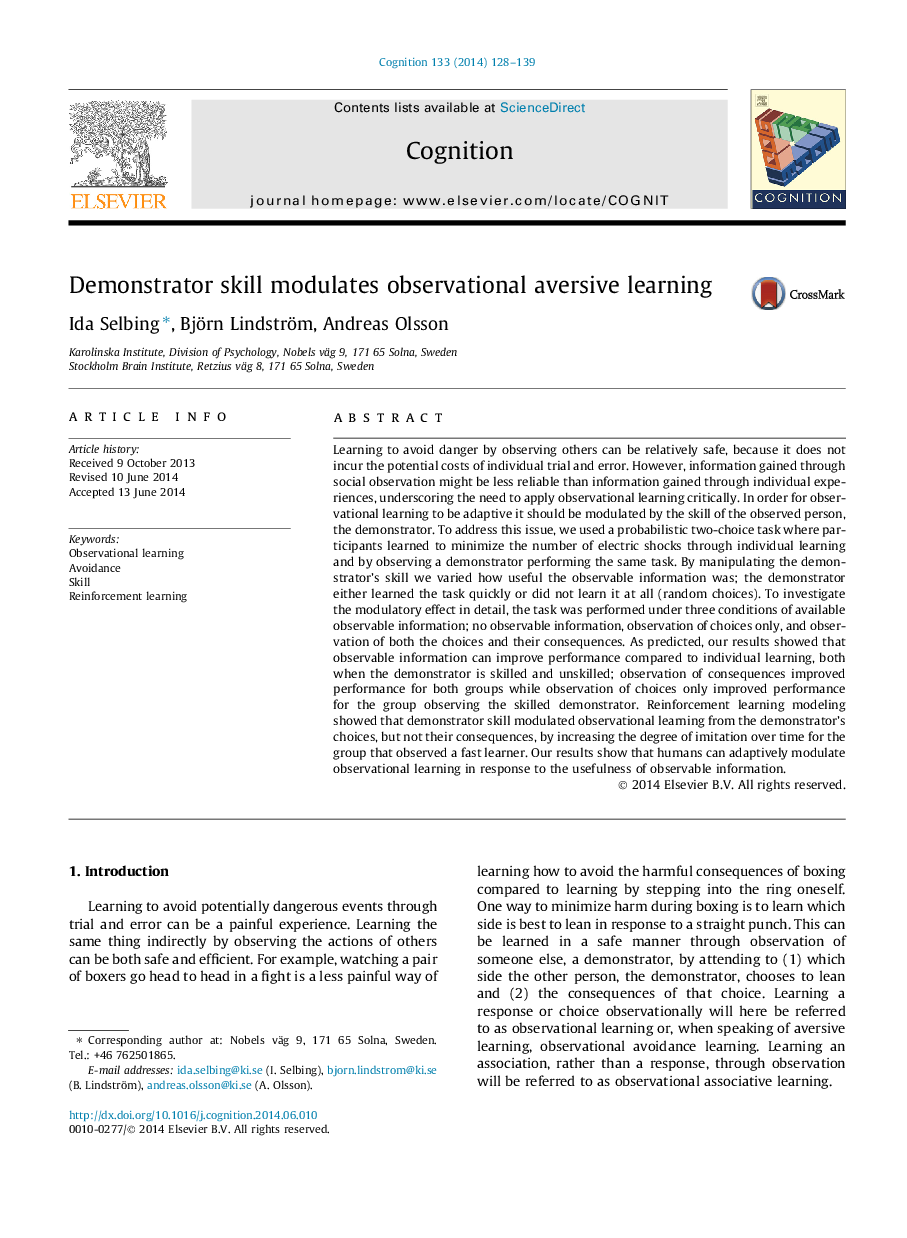| کد مقاله | کد نشریه | سال انتشار | مقاله انگلیسی | نسخه تمام متن |
|---|---|---|---|---|
| 10457729 | 921887 | 2014 | 12 صفحه PDF | دانلود رایگان |
عنوان انگلیسی مقاله ISI
Demonstrator skill modulates observational aversive learning
ترجمه فارسی عنوان
مهارت نمادین، یادگیری ناآگاهانه را مشاهده می کند
دانلود مقاله + سفارش ترجمه
دانلود مقاله ISI انگلیسی
رایگان برای ایرانیان
کلمات کلیدی
یادگیری بصری، اجتناب از، مهارت، تقویت یادگیری،
ترجمه چکیده
یادگیری برای رفع خطر با مشاهده سایر موارد می تواند نسبتا امن باشد، زیرا هزینه های بالقوه محاکمه و خطای فردی را تحمل نمی کند. با این وجود، اطلاعاتی که از طریق مشاهده اجتماعی کسب شده اند، کمتر قابل اطمینان از اطلاعاتی است که از طریق تجارب فردی به دست می آید، و بر ضرورت استفاده از یادگیری مشاهدات انتقادی تأکید می کند. برای اینکه یادگیری مشاهداتی به عنوان سازگاری باشد، باید با مهارت شخص مشاهده شده، تظاهر کننده، تعدیل شود. برای مقابله با این مسئله، ما از یک کارآزمایی احتمالی دو گزینه ای استفاده کردیم که در آن شرکت کنندگان به منظور کاهش تعداد شوک های الکتریکی از طریق آموزش فردی و مشاهده یک تظاهر کننده که همان کار را انجام می دادند، یاد گرفتند. با دستکاری مهارت تظاهر کننده، ما تغییر کردیم که اطلاعات قابل مشاهده مفید است؛ تظاهر کننده سریعا این کار را به یاد می آورد و یا آن را یاد نمی گیرد (انتخاب های تصادفی). برای بررسی اثر مدولاسیون در جزئیات، وظیفه تحت سه شرایط اطلاعات مشاهده قابل دسترس انجام شد؛ هیچ اطلاعات قابل مشاهده، مشاهده تنها انتخاب ها و مشاهده هر دو گزینه ها و پیامدهای آنها نیست. همانطور که پیش بینی کرد، نتایج ما نشان داد که اطلاعات قابل مشاهده می تواند عملکرد را نسبت به یادگیری فردی بهبود بخشد، هر چند زمانی که تظاهر کننده ماهر و غیر متخصص باشد؛ مشاهده عواقب بهبود عملکرد برای هر دو گروه، در حالی که مشاهده انتخاب تنها عملکرد بهبود یافته برای گروه مشاهده تظاهر کننده ماهر است. مدل سازی یادگیری تقویت کننده نشان داد که مهارت تظاهرکننده، یادآوری مشاهداتی را از انتخاب تظاهرکنندگان مدول می کند، اما نه پیامدهای آن، با افزایش میزان تقلید در طول زمان برای گروهی که یادگیرنده را مشاهده می کند. نتایج ما نشان می دهد که انسان ها می توانند در پاسخ به سودمندی اطلاعات قابل مشاهده، انعطاف پذیری یادگیری مشاهدات را تعدیل کنند.
موضوعات مرتبط
علوم زیستی و بیوفناوری
علم عصب شناسی
علوم اعصاب شناختی
چکیده انگلیسی
Learning to avoid danger by observing others can be relatively safe, because it does not incur the potential costs of individual trial and error. However, information gained through social observation might be less reliable than information gained through individual experiences, underscoring the need to apply observational learning critically. In order for observational learning to be adaptive it should be modulated by the skill of the observed person, the demonstrator. To address this issue, we used a probabilistic two-choice task where participants learned to minimize the number of electric shocks through individual learning and by observing a demonstrator performing the same task. By manipulating the demonstrator's skill we varied how useful the observable information was; the demonstrator either learned the task quickly or did not learn it at all (random choices). To investigate the modulatory effect in detail, the task was performed under three conditions of available observable information; no observable information, observation of choices only, and observation of both the choices and their consequences. As predicted, our results showed that observable information can improve performance compared to individual learning, both when the demonstrator is skilled and unskilled; observation of consequences improved performance for both groups while observation of choices only improved performance for the group observing the skilled demonstrator. Reinforcement learning modeling showed that demonstrator skill modulated observational learning from the demonstrator's choices, but not their consequences, by increasing the degree of imitation over time for the group that observed a fast learner. Our results show that humans can adaptively modulate observational learning in response to the usefulness of observable information.
ناشر
Database: Elsevier - ScienceDirect (ساینس دایرکت)
Journal: Cognition - Volume 133, Issue 1, October 2014, Pages 128-139
Journal: Cognition - Volume 133, Issue 1, October 2014, Pages 128-139
نویسندگان
Ida Selbing, Björn Lindström, Andreas Olsson,
